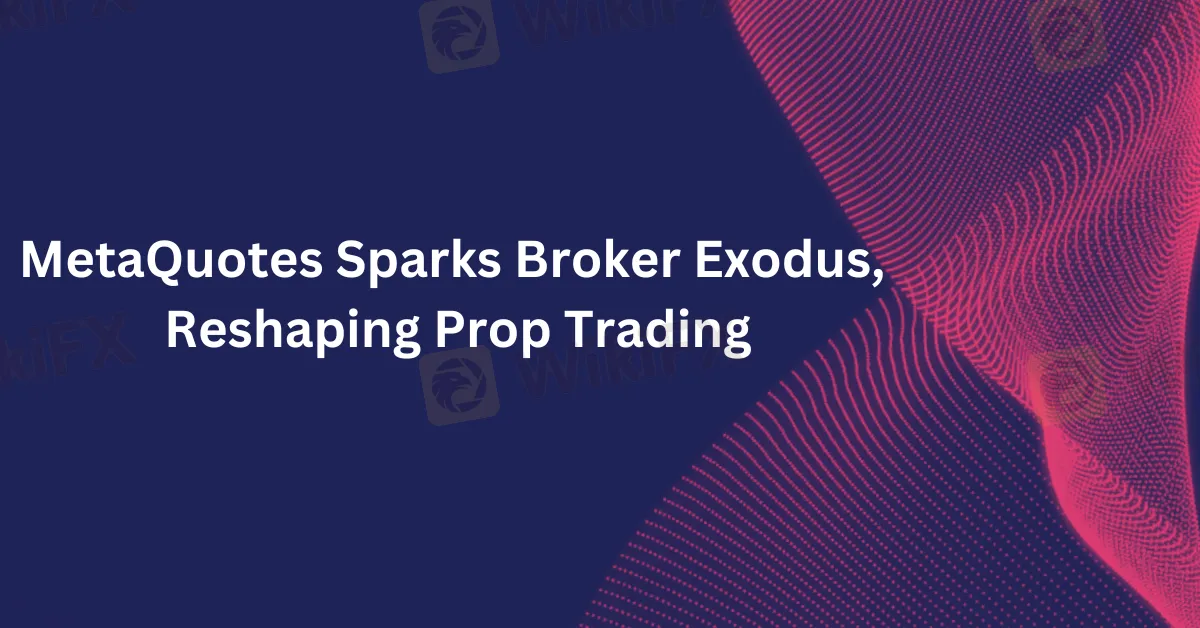简体中文
繁體中文
English
Pусский
日本語
ภาษาไทย
Tiếng Việt
Bahasa Indonesia
Español
हिन्दी
Filippiiniläinen
Français
Deutsch
Português
Türkçe
한국어
العربية
MetaQuotes Sparks Broker Exodus, Reshaping Prop Trading
Abstract:The oversight from MetaQuotes, the developer behind the widely used MT4 and MT5 trading platforms, is undergoing further reinforcement, exerting a direct influence on brokers and proprietary trading firms that cater to clients in the United States.

MetaQuotes, the developer behind the popular MT4 and MT5 trading platforms, is intensifying its oversight, causing a direct impact on brokers and proprietary trading firms catering to US clients.
This stricter approach has resulted in several prop firms discontinuing services, exemplified by Australian broker Eightcap, which declared its decision to cease serving proprietary trading firms by February 29.
This unexpected move has left many in the industry scrambling for alternatives. Matt Lark, CEO of Lark Funding, shared this development on X, expressing that while Eightcap's decision poses a setback, reassurances from ThinkMarkets regarding their operations and “solid relationship” with MetaQuotes have been received. Lark acknowledged the necessity for the prop trading industry to diversify brokerage relationships, assuring traders of plans in place for a smooth transition from Eightcap to new brokers.
The community's response has been a mixture of concern and confusion. Conversations on X indicate an urgent need to adapt to these changes, with compliance timelines reportedly varying according to different sources. Speculation suggests that brokers violating jurisdictional regulations must rectify their status by as late as June 30.

The impact of these policy changes reverberates globally, affecting prop firms and their clients. Notably, Top Tier Trader has reportedly restricted traders from several countries, including the UK, India, and Germany, offering refunds while withholding payouts.
Meanwhile, prop firms like The5ers and Smart Prop Trader openly discuss the challenges arising from brokers' reluctance to onboard third-party clients, a practice now under scrutiny. These firms argue that the indirect relationship between prop traders and brokers complicates compliance with regulatory standards. Consequently, a shift towards brokers accommodating third-party arrangements, such as cTrader, is underway.
Prop firms affected by the shift away from Eightcap and seeking new brokerage services include Blue Guardian, Funded Trading Plus, and The Funded Trader. Those relying on ThinkMarkets encompass AquaFunded, Bespoke, Forex Capital Funds, Goat Funded Trader, Instant Funding, Lark Funding, Ment Funding, My Flash Funding, My Funded FX, Skilled Funded Traders, Swift Funding, The Funded Trader, and Traddoo.

Disclaimer:
The views in this article only represent the author's personal views, and do not constitute investment advice on this platform. This platform does not guarantee the accuracy, completeness and timeliness of the information in the article, and will not be liable for any loss caused by the use of or reliance on the information in the article.
Read more

Countdown to WikiEXPO Dubai 2024 — “Seeing Diversity, Trading Safely”
With the booming development of the global Fintech industry, WikiEXPO Dubai 2024, hosted by WikiGlobal and co-organized by WikiFX, will officially kick off on November 27, themed “Seeing Diversity, Trading Safely.” This event will bring together global elites to explore the future of Fintech.

Elon Musk Sparks Debate Over Presidential Power and Federal Reserve Independence
Elon Musk has voiced his support for the controversial idea that United States presidents should have a role in shaping Federal Reserve policies. This endorsement aligns with recent remarks from President-elect Donald Trump, who has hinted at revisiting the central bank's independence, a long-held tradition in the nation's financial governance.

Consob Sounds Alarm: WhatsApp & Telegram Users Vulnerable to Investment Scams
Italy's financial regulator, Consob, has raised alarms over an increase in fraudulent schemes targeting investors through mobile messaging platforms such as WhatsApp and Telegram.

Crypto 101: Coins vs Tokens
For those new to the world of cryptocurrency, terms like "coin" and "token" may seem interchangeable. However, understanding the distinction between these two digital assets is crucial for navigating the crypto landscape. Both coins and tokens serve as integral components of blockchain ecosystems, yet they differ in their functionalities, use cases, and the technologies underpinning them.
WikiFX Broker
Latest News
BSP Shuts Down Uno Forex Over Serious AML Violations
ACY Securities Expands Global Footprint with South Africa Acquisition
Tokyo Police Arrest 4 for Unregistered FX Trading Scheme
Rupee gains against Euro
WikiEXPO Global Expert Interview: The Future of Financial Regulation and Compliance
DFSA Warns of Fake Loan Approval Scam Using Its Logo
Consob Sounds Alarm: WhatsApp & Telegram Users Vulnerable to Investment Scams
CySEC Revokes UFX Broker Licence as Reliantco Halts Global Operations
Bitcoin ETF Options Get Closer to Reality with CFTC Clarification
US Regulators Tighten Oversight on Bank Anti-Money Laundering Efforts
Currency Calculator


